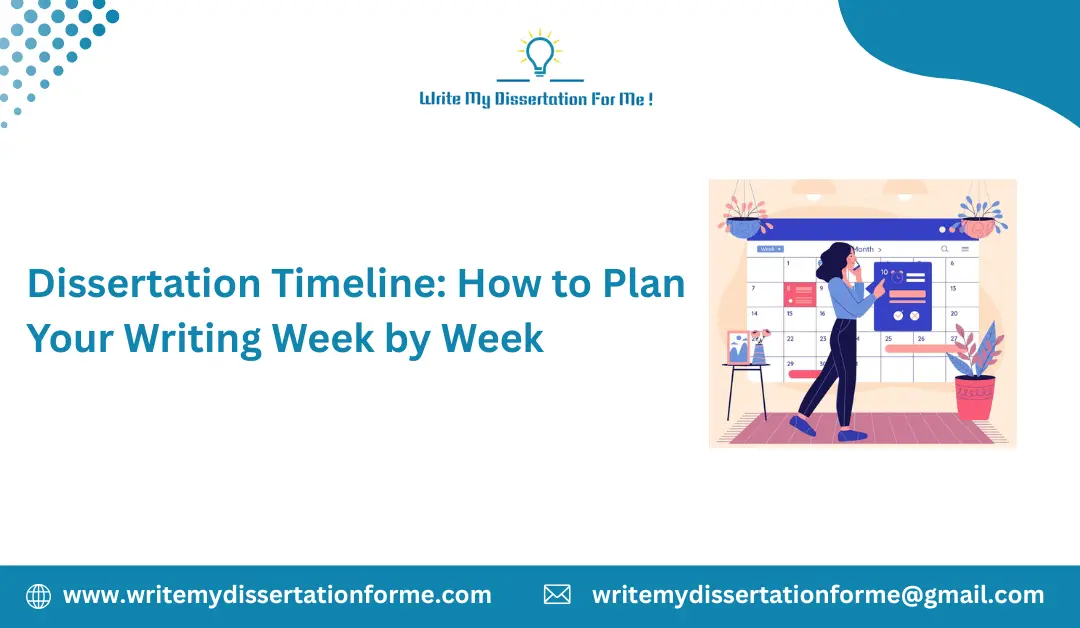Dissertation Timeline: How to Plan Your Writing Week by Week
September 15 2025 | 04 min read

Writing a dissertation is not just about researching and writing—it’s about planning, organising, and pacing yourself so that you can meet deadlines without stress. Many students underestimate the time required, leading to last-minute panic, sleepless nights, and rushed chapters that don’t reflect their true potential. A carefully planned dissertation timeline allows you to stay on track, manage workload efficiently, and produce a high-quality final document.
In this blog, we’ll walk you through a week-by-week writing plan to help you navigate each stage of your dissertation with clarity. Whether you’re working on a master’s project or a PhD, this structured timeline can be adapted to fit your deadlines. And if you ever find yourself stuck, remember that professional dissertation writing assistance is always available to keep you on track.
Why a Dissertation Timeline Matters:
Think of your dissertation as a marathon, not a sprint. Without pacing, you’ll run out of energy too early or fall behind schedule. A dissertation timeline:
- Breaks a massive project into manageable tasks.
- Helps you allocate realistic time for research, writing, and revisions.
- Prevents procrastination and stress before submission.
- Ensures balance between quality and deadlines.
Instead of feeling overwhelmed by a 15,000–80,000-word dissertation, you’ll focus on clear, weekly goals.
General Structure of the Timeline
Most dissertations follow similar stages:
- Topic selection and proposal
- Literature review
- Methodology
- Data collection
- Data analysis
- Writing chapters (findings, discussion, conclusion)
- Editing and proofreading
We’ll now build these into a week-by-week schedule.
Weeks 1–2: Topic Selection and Proposal:
- Choose a topic: Narrow down an area of interest that is researchable and relevant.
- Do preliminary reading: Skim journal articles and books to confirm availability of sources.
- Draft a research proposal: State your research question, objectives, and methodology.
- Seek supervisor approval: Incorporate their feedback before moving forward.
Weeks 3–6: Literature Review:
- Collect sources systematically: Use databases like JSTOR, Google Scholar, Scopus.
- Organise references: Use Zotero, EndNote, or Mendeley.
- Identify gaps in the literature: Show what has already been studied and where your work fits.
- Draft review sections: Group sources thematically rather than summarising them one by one.
Goal: By the end of week 6, you should have a 4,000–6,000-word draft (for master’s level) of your literature review.
Weeks 7–8: Methodology Chapter:
- Explain research design: Qualitative, quantitative, or mixed methods.
- Detailed methods: Interviews, surveys, experiments, or archival research.
- Justify choices: Show why your method fits your research question.
- Address ethics: Explain how you gained approval and ensured participant confidentiality.
This chapter sets the stage for your data collection. Be specific.
Weeks 9–12: Data Collection:
- Qualitative projects: Conduct interviews, focus groups, or observations.
- Quantitative projects: Distribute surveys, run experiments, or access databases.
- Keep detailed notes: Maintain transcripts, recordings, and logs.
- Troubleshoot issues: Factor in delays (low survey response rates, rescheduling interviews, etc.).
Weeks 13–15: Data Analysis:
- Qualitative data: Use coding techniques, NVivo, or manual thematic analysis.
- Quantitative data: Run statistical tests using SPSS, R, or Python.
- Present key findings visually: Tables, charts, and graphs make results clear.
- Start linking results to your research questions.
By week 15, you should have clear answers (or at least patterns) emerging.
Weeks 16–18: Findings Chapter:
- Present results without interpretation.
- Use visuals strategically: Graphs, tables, and charts should enhance readability.
- Be objective: Report both expected and unexpected outcomes.
Weeks 19–21: Discussion Chapter:
- Interpret findings: Explain what the results mean in the context of your research question.
- Compare with literature review: Do your findings support, contradict, or expand previous studies?
- Highlight implications: Theoretical, practical, or policy-related.
- Acknowledge limitations: Be honest about weaknesses.
This chapter showcases your critical thinking, so allow plenty of time.
Weeks 22–23: Conclusion and Recommendations:
- Summarise main findings concisely.
- Answer your research question directly.
- Propose recommendations: For policy, practice, or further research.
- Keep it short but impactful.
Weeks 24–25: Editing and Proofreading:
- Check structure and flow: Ensure each chapter connects logically.
- Refine language: Eliminate jargon, redundancy, and long sentences.
- Check formatting: Page numbers, font size, margins, referencing style.
- Proofread thoroughly: Check grammar, spelling, and consistency.
This stage often takes longer than expected; plan for at least two weeks.
Week 26: Final Checks and Submission:
- Verify references: Ensure every citation matches your bibliography.
- Compile appendices: Include raw data, questionnaires, transcripts.
- Run plagiarism checks: Make sure your work is 100% original.
- Submit before the deadline: Avoid last-minute technical issues.
How a Dissertation Writing Service Can Help:
Even with the best timeline, life happens. Illness, work obligations, or research setbacks can derail your progress. In such cases, a reliable dissertation writing service can provide crucial support.
Professional writers can:
- Assist with literature review summaries.
- Offer statistical help for data analysis.
- Provide chapter drafts for guidance.
- Deliver editing and proofreading to polish your work.
Think of it as a safety net, ensuring you never miss a deadline.
Not every student needs full-scale writing support, but dissertation help can be invaluable if:
- You’re stuck on a specific chapter (like methodology).
- You’re unsure about structuring findings.
- English is not your first language and clarity is a challenge.
- You have the research but struggle with academic writing.
Instead of wasting weeks, you can save time and boost quality with expert input.
Benefits of Dissertation Writing Assistance:
Here’s how dissertation writing assistance fits into your timeline:
- Time management: Professionals handle formatting, references, and proofreading while you focus on content.
- Clarity: Experts simplify complex results into readable sections.
- Confidence: You submit knowing your dissertation meets academic standards.
- Stress relief: Less panic, more productivity.
Ultimately, it’s about working smarter, not harder.
Sample Weekly Timeline (26 Weeks)
Final Thoughts:
A dissertation is not written overnight—it’s built step by step, week by week. By following a structured timeline, you’ll avoid the last-minute rush and produce work you can be proud of. Remember to stay flexible, adapt to challenges as they arise, and seek help when needed.
Whether you rely on a supervisor’s feedback, peer support, or a professional dissertation writing service, the goal remains the same: to produce a polished, original, and well-argued piece of research.
Plan smart, write steadily, and use dissertation writing assistance when you need it—because with the right timeline and support, success is not just possible, it’s inevitable.
If you loved reading this, please share this,
also read

The Importance of Plagiarism-Free Work in Academic Writing
In academic writing, keeping the integrity and originality of your work is critical. Plagiarism, the act of utilizing someone...

Top 10 Tips For Writing A Dissertation Methodology
The top ten suggestions for writing your dissertation methodology are listed below. You can use this as a checklist to help y...

The Ultimate Checklist for a Winning Dissertation Proposal
Creating a proposal for your dissertation is an essential part of your academic path. This is your chance to outline your res...